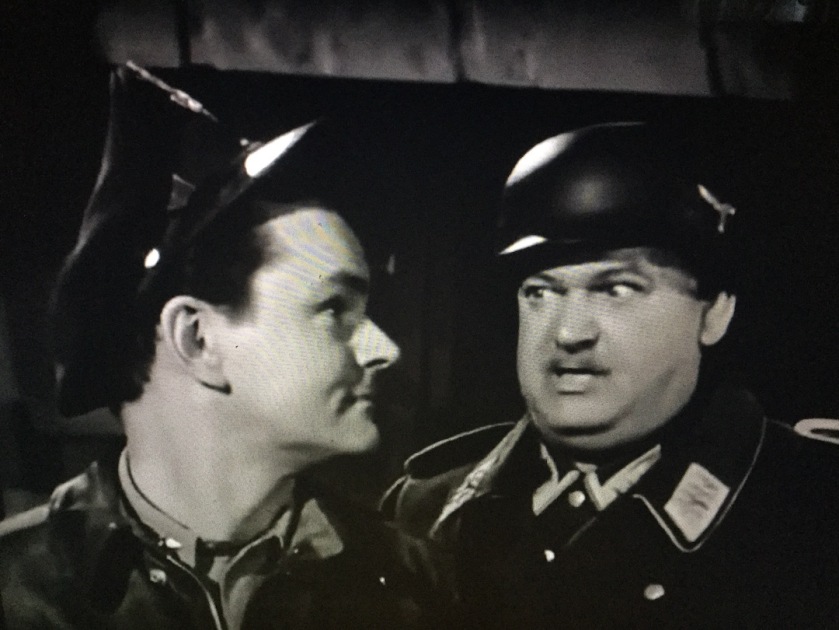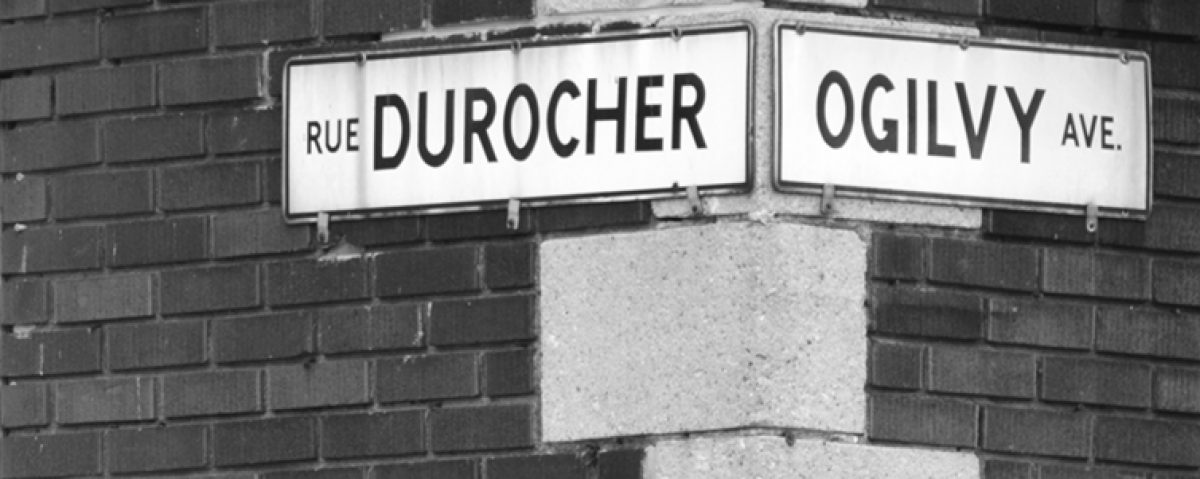 In the first week of real spring weather in Montreal, on May Day, a Nazi flag blossomed from a rooftop on Hutchison Street, in Park Extension. For a few days it was all over the news, and the original event was then swamped by coverage of a weekend rally protesting the flag and the owner’s right to fly it.
In the first week of real spring weather in Montreal, on May Day, a Nazi flag blossomed from a rooftop on Hutchison Street, in Park Extension. For a few days it was all over the news, and the original event was then swamped by coverage of a weekend rally protesting the flag and the owner’s right to fly it.
Over the same weekend, I attended a memorial service at a Greek church and, while listening to the familiar prayers and chanting from the priest and the psalti, I yawned helplessly, as I always do, and reflected on how hate is a kind of death, how it always tends toward extinction.
After the service we descended to the basement for the traditional coffee, biscuits (παξιμάδια) and wheat berries (κόλλυβa), spiked with a nip of Metaxa, and discussed the recent irruption of racism in our backyards. Someone at the table remarked on the irony of displaying a symbol of white supremacy in Park Ex, in a neighbourhood of immigrants.
It was a weekend of sad reflection, made more poignant by the daffodils and bright sun. Somehow, something got away from us when we weren’t looking. Something big happened right under our noses that we never saw coming.
And now we study the horizon, interrogate the flight of birds, scrutinize that distant column of smoke.
The dread, and dread introspection, reminds me of Constantine Cavafy’s poem, Waiting for the Barbarians, and particularly its haunting conclusion (from Daniel Mendelsohn’s recent translation):
— Why has this uneasiness arisen all at once,
and this confusion? (How serious the faces have become.)
Why is it that the streets and squares are emptying so quickly,
and everyone’s returning home in such deep contemplation?
Because night has fallen and the barbarians haven’t come.
And some people have arrived from the borderlands,
and said there are no barbarians anymore.
And now what’s to become of us without the barbarians.
Those people were a solution of a sort.
We are busy casting for the barbarians. We dread who will show up for the audition. It might be us…or no one.
Hogan’s Heroes
I went to high school with a boy — John Lennon glasses, horsy face behind long, dirty-blonde hair, goofy laugh — also from Park Ex, whose parents had emigrated from Germany after the war.
I don’t know where his father served, and in what capacity, but I do remember him in a graduation robe draped with Dad’s Nazi regalia. (I may even have a photo of this somewhere.) We all thought this was funny and mildly transgressive, but we were not appalled. He was not hauled off to the principal’s office and his picture did not appear in the paper. There was no talking-to.
Our school had enough Greeks, Armenians, Chinese and Afro-Canadians for each group to have its own large and very busy club. We got along, went to each other’s dances, did homework together. The German kid, the son of immigrants, like most of us, was on friendly terms with everyone — a nice guy!
We lived in more innocent times.
During this same period, incredibly, one of the most popular TV shows was a sit-com set in a German POW camp. Granted, Hogan’s Heroes was not set in an extermination camp, with its crematoria and other period amenities, so there was plenty of space for comedy. The bumbling guard, Schultz, and the clueless Commandant Klink were no match for the clever American and other Allied prisoners who pretty much ran the place. Schulz even had a catchphrase, “I see nothing,” which absolved him from reporting on the prisoners’ tunnel-digging and easy access to the outside world.
The futility of remembrance
The injunction to remember (all Quebecers drive around with Je me souviens on their license plates, urging remembrance about a totally different matter) seems to me hopelessly naïve. Human progress, let alone perfectibility, will always be laughably out of reach, a chimera. We do not remember and we do not learn. And yet, quixotically, stubbornly, perhaps stupidly, some of us feel the necessity to take sides, because there really is no alternative.
Two weeks ago, in Toronto, an incel driving a rented van careened into crowds on Yonge Street, killing ten people and injuring thirteen. Overnight, we learned what incel means.
Last week the Montreal Gazette revealed that one of the Übermenschen of North American white supremacy is a Montrealer. He marched in Charlottesville last year with his angry brothers (they’re pretty much all men), carrying torches and chanting, “Jews will not replace us!” (whatever that means; they could use a wordsmith, methinks).
The article also reminded me that a member of my family with whom I no longer speak has made a career of providing academic cover for this shabby brotherhood. So, as it turns out, the Nazi flag has not only breached the gates, it is blooming right outside my office window, overlooking my daffodils. I could, like Schulz, pretend that I see nothing, but this is no longer possible.

Hi Spryros; You’ve expressed this so well. Lines are blurred, and it can be brother against brother.
LikeLike
You are so right. Lines are indeed blurred, and I hope this came across.
LikeLike
Such a timely piece.
Respect my brother!
LikeLike
Props to you.
LikeLike
Powerful! Good job.
Xx
E
Eirini Demetelin | Travel Designer
LikeLike
Thanks, Eirini.
LikeLike
Your piece sent me on several hunts, one for the full poem, which I found by another translator, a second for interpretations (mine only ever seem half-baked), a third for the translation by Mendelsohn, and finally I enjoyed a long perusal through sites related to Mendelsohn himself. Thank you for these introductions. Back to your piece, its options were provocative: don’t react, react; we can think we know, we can’t know; taking sides is futile, taking sides is necessary, and various nuances in between. I was left feeling bleak, but there’s much to contemplate in that. I loved the poetry of the line about studying, interrogating and scrutinizing, imbued as it is with emptiness. I was jarred by the word amenities, or the absence of a telling adjective to accompany it. And so I procrastinated, and now the workday is almost done.
LikeLike
I’m flattered by the time and care you took, and sorry if I took up most of your day. But I’m also grateful. Yes to the sense of ambivalence, especially as the poem itself is ambivalent about who the barbarians are, whether they are coming or not, and why they are delayed (or possibly not coming at all), otherwise it wouldn’t be a poem. It would be a boring essay. If I think of the current state of affairs too long, a sense of bleakness does seem like the natural reaction. But for others, the natural reaction is a sense of triumph.
LikeLike
Later that night I pulled J.M. Coetzee’s Waiting for the Barbarians off my shelf and read that too! It had been well over 30 years, and it’s still word-perfect. Coetzee identifies three kinds of barbarians: the nameless, faceless ones “out there” (not actually barbarians), the ignorant, arrogant out-of-town servants of the Empire (raging barbarians), and the sleepy, comfortable, more or less decent Magistrate of the town (a lesser barbarian but deeply complicit). I think we agree that the third is us. Well, not Isobel’s dad. What a great story.
LikeLike
You continue to delight me. Thanks. And now I have to go back and reread Waiting for the Barbarians, which, as you remark, is word-perfect.
LikeLike
My interpretation is that it is easy to let the barbarians ( others, naturally) carry the weight of racism, stupidity, brutality. If we keep our focus on them, we don’t have to look at our own faults. If their evil is truly grotesque so much the better. That we means we are really off the hook. I hadn’t heard about the flag incident.
My dad was in the navy during the war and he insisted on us having an exchange student from Germany in the 50’s. My brother was supposed to go the boy’s home the year we came to Canada. My dad felt we should get to know ” the enemy” as human beings. My mother had no such lofty principles but, as a good polite Brit, she tolerated Claus. Hogan’s Heros was a strange subversive idea, when you think about it. Ridicule the fearful monster. I don’t think it works in real life.
LikeLike
I think you’re spot on about the barbarians. They are just as easily us. This fuels some of the dread in the poem. Your father was an interesting idealist, especially because he served in the navy. I’ve never served in a war, but I can easily imagine the potentially levelling effect of the experience: you understand the other much more clearly than if you’re sitting back home, anxious about your loved ones and being fed inaccurate and misleading information. Does ridicule work? I honestly don’t know.
LikeLike
The internet has provided a platform for all sorts of small and unique groups to “gather”. Forums provide “information”, community, affirmation – for good and for evil. Today’s Gazette offers a follow-up article revealing that the Montreal white supremacist you mention has written a guide on how not to get “doxxed’ (have their identity revealed publicly). Few among these cowards don’t hide behind encrypted websites and covered faces during protests. Their version of free speech doesn’t come with access to the source.
Under threat of exposure after the Virginia protests many of them seemingly “reevaluated” their positions and ran for the hills. Seems so simple – were they dedicated to a cause or to a vague idea that found a home in a closed on-line society? You are right that we had better start paying more attention to affect these corrections.
Thanks for the post.
LikeLike
I suppose it’s easy to make plans, proselytize and work yourself into a froth when there are no dissenting voices. But then something bad happens. And you become even more entrenched and go underground, or begin to re-evaluate. But I can’t presume to know what goes on inside their heads. Thanks for reading and commenting, Gerry.
LikeLike